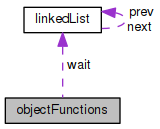#include <object.h>
|
| void(* | destroy )(struct object *obj) |
| |
| uint32_t(* | getMinHandle )(struct object *obj) |
| |
| void(* | shutdown )(struct object *obj, uint32_t mode) |
| |
| int32_t(* | getStatus )(struct object *obj, uint32_t mode) |
| |
| struct linkedList *(* | wait )(struct object *obj, uint32_t mode, uint32_t *result) |
| |
| void(* | signal )(struct object *obj, uint32_t result) |
| |
| int32_t(* | write )(struct object *obj, uint8_t *buf, uint32_t length) |
| |
| int32_t(* | read )(struct object *obj, uint8_t *buf, uint32_t length) |
| |
| bool(* | attachObj )(struct object *obj, struct object *subObj, uint32_t mode, uint32_t ident) |
| |
| bool(* | detachObj )(struct object *obj, uint32_t ident) |
| |
Definition at line 42 of file object.h.
◆ attachObj
| bool(* objectFunctions::attachObj) (struct object *obj, struct object *subObj, uint32_t mode, uint32_t ident) |
◆ destroy
| void(* objectFunctions::destroy) (struct object *obj) |
◆ detachObj
| bool(* objectFunctions::detachObj) (struct object *obj, uint32_t ident) |
◆ getMinHandle
| uint32_t(* objectFunctions::getMinHandle) (struct object *obj) |
◆ getStatus
| int32_t(* objectFunctions::getStatus) (struct object *obj, uint32_t mode) |
◆ read
| int32_t(* objectFunctions::read) (struct object *obj, uint8_t *buf, uint32_t length) |
◆ shutdown
| void(* objectFunctions::shutdown) (struct object *obj, uint32_t mode) |
◆ signal
| void(* objectFunctions::signal) (struct object *obj, uint32_t result) |
◆ wait
◆ write
| int32_t(* objectFunctions::write) (struct object *obj, uint8_t *buf, uint32_t length) |
The documentation for this struct was generated from the following file:

 1.8.13
1.8.13